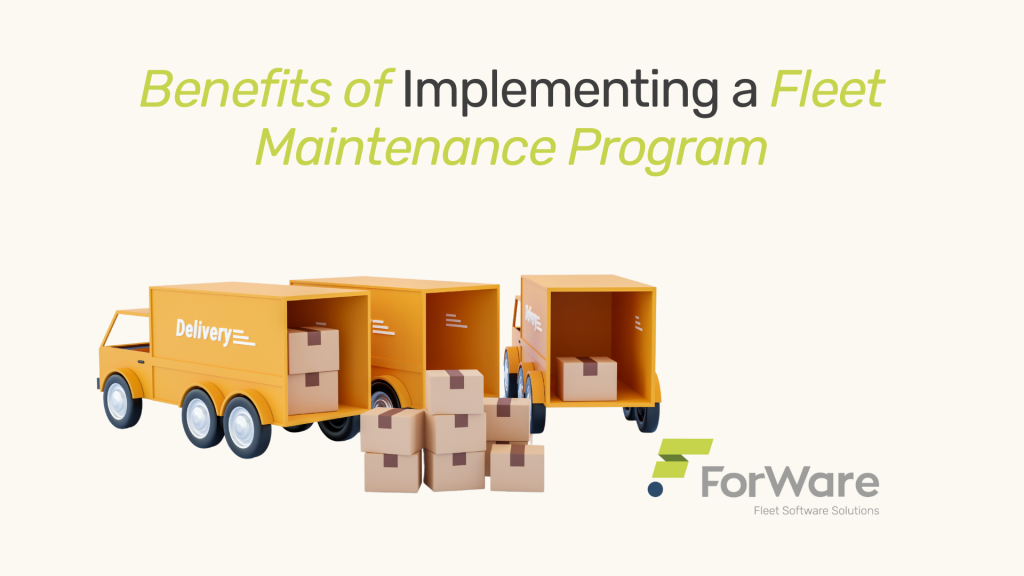An effective Fleet Maintenance program is essential to your fleet’s efficiency (and, in turn, your business’s). When setting up a Fleet Maintenance program, you need to plan out and consider vehicle type(s), expected mileage, manufacturer guidelines around Vehicle Health Checks and service intervals. Detailed record-keeping is also essential. It’s a lot to account for, so I’ve put together this article going through crucial areas that you need to consider and how you can implement them effectively.
Vehicle Health Checks are vital for your fleet
You cannot underestimate the importance of ensuring that Vehicle Health Checks (VHCs) are incorporated into your company’s fleet maintenance program. While some Fleet Managers may be tempted to skip these and wait until an actual service is due, this can cause significant problems down the road. For one thing, manufacturer warranty programs generally require a vehicle to undergo VHCs at appointed intervals. Failing to do this, you will end up in trouble when processing a warranty claim and may well end up being rejected. Imagine explaining to your bosses that the company now has to pay out several thousand euro for a gearbox repair because you didn’t send the vehicle for a simple VHC last year.
It should go without saying, but VHCs are also beneficial for curtailing minor problems before they cause bigger ones. Perhaps one of your fleet’s brake discs is worn prematurely — better catch it now than have it lead to an accident before the next service. Vehicle Health Checks will also help increase efficiency by reducing downtime. Catching minor problems early (such as the above example) will avoid the vehicle having multiple trips to the garage.
Fleet Servicing is not to be skipped
I am stating the obvious, but keeping to your vehicle manufacturer’s service guidelines is absolutely critical to all Fleet Maintenance programs. Study these carefully (the exact service interval may vary between different vehicle types in your fleet (even among different vehicles from the same manufacturer). Pay close attention to both time and mileage intervals, particularly if your fleet is putting in high mileage. For instance, a diesel vehicle might have a service interval of every 2 years OR 30,000km — so if a fleet vehicle is clocking up 30,000km per annum, it would be foolhardy to wait another year before a service is due. Aside from running vehicles with worn equipment, it’s also voiding your fleet’s warranty. And as we discussed under Vehicle Health Checks, this can have costly repercussions for getting repairs done under warranty.
Reduce Fleet Maintenance costs with Service Plans and Parts Bundles.
Service Plans are a fantastic way to achieve significant savings in parts and labour costs across your fleet. They’re tailored to each vehicle type, and the ForWare system allows full integration with manufacturer service plans. This helps with financial forecasting of your fleet service spend too. Your bosses will thank you for this; no business likes spending more than they have to.
Keep good Fleet Service Records
A good Fleet Maintenance program relies on quality records and access to live data. To plan your fleet’s maintenance, you need to keep records of when the last service or Vehicle Health Check was done and, of course, when the next is due. While you could do this manually, a comprehensive Fleet Maintenance system such as ForWare will do all of this for you electronically. It also allows for connection with garage DMS systems so that maintenance records can feed through even if you’re using multiple garages to service your fleet.
Have an effective communication system in place with your Fleet Maintenance provider
Smooth communication with your garage(s) is essential for an efficient Fleet Maintenance plan. This starts with the service booking process, continuing through work authorisation right through to billing at the end. With some systems, this can fall apart quickly, with work authorisation delays being a major contributory factor to vehicle service delays and resulting inefficiency. ForWare offers full integration in all these areas with most of the garage’s CRM system, reducing time, waste and costs for everybody involved in Fleet Maintenance processes.
Be wary of warranty when it comes to Fleet Maintenance
Never overlook your vehicle manufacturer’s warranty policy when it comes to Fleet Maintenance. The amount of time, and even mileage, warranty policies cover vary from manufacturer to manufacturer, particularly when it comes to commercial vehicles. This may be a factor worth considering when it comes to fleet replacement time. As mentioned earlier, never ever disregard your vehicle’s appointed VHC and service intervals — it can void your warranty and prove very costly.
Don’t be overwhelmed by Fleet Maintenance planning
A good Fleet Maintenance plan has plenty of factors to consider. It requires detailed planning and record keeping. An ineffective Fleet Maintenance plan can become unwieldy and go awry very quickly, leading to major problems (and expense). Don’t fret. An effective fleet maintenance software package such as ForWare will look after much of this for you. It can be tailored to suit the maintenance needs of your fleet, it’s not a one-size-fits-all solution. Set-up and training on the ForWare Fleet Maintenance system is quick and efficient. ForWare can integrate with other DMS systems (such as KeyLoop) and even offer integrated billing, service alert notifications, booking and even two-way job authorisation.



